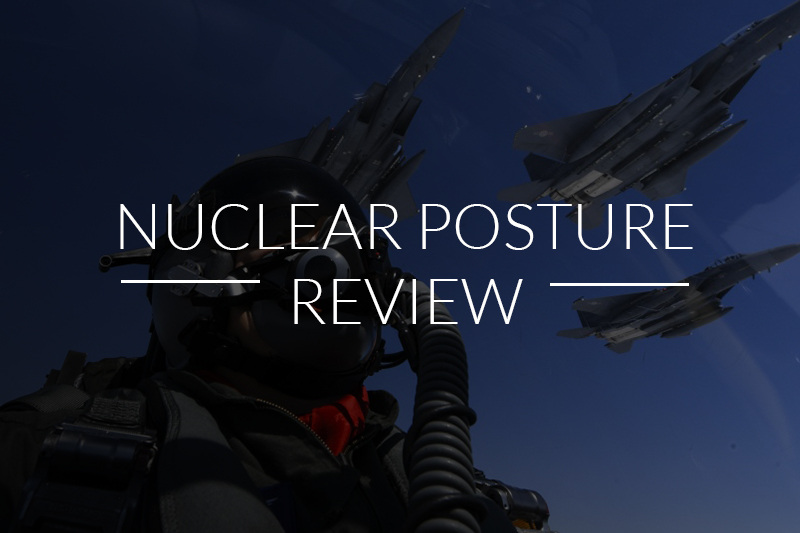
Sydney Kakuk
Herbert Scoville Jr. Peace Fellow, Global Nuclear Policy Program
Atomic Pulse
Russia’s invasion of Ukraine and the accompanying nuclear threats by Russian President Vladimir Putin have renewed fears of nuclear catastrophe. As President Biden said recently, “For the first time since the Cuban Missile Crisis, we have a direct threat to the use of nuclear weapons.” Not since the end of the Cold War have atomic weapons been of such interest to the global public. Against this backdrop, the Biden Administration released its Nuclear Posture Review (NPR) on October 27, a document long-awaited by U.S. nuclear policy experts and the international community. Though the administration began crafting the NPR early in Biden’s term, the document’s relevance has been magnified by the heightened nuclear risks facing the world.
The NPR gives a unique perspective into a presidential administration’s global security objectives. Since the Clinton Administration, each U.S. president has released an NPR to outline its policies on the role of nuclear weapons in U.S. national security. Like its predecessor, the Biden Administration’s NPR prioritizes maintaining a safe, secure, and effective nuclear deterrent for as long as nuclear weapons exist. It also reaffirms that the United States would only consider using nuclear weapons in extreme circumstances to defend the vital interests of the United States or its allies and partners.
The 2022 NPR highlights the deteriorating security environment, noting that by the 2030s the United States, for the first time, will face two major nuclear powers as strategic competitors and potential adversaries: Russia and China.
The Biden Administration’s NPR also reaffirms the U.S. commitment to preventing Iran from acquiring nuclear weapons and working on eliminating North Korea’s nuclear weapons program through diplomatic means. It explicitly states that any nuclear attack by North Korea on the United States, its allies, or its partners will result “in the end of the Kim regime.”
In response to the security environment, the NPR commits to modernizing the U.S. nuclear arsenal and concludes that the low-yield D5 sea-launched ballistic missile developed by the Trump Administration provides an important capacity to ensure a flexible nuclear deterrent. However, the Biden NPR reverses the 2018 NPR decision to develop a submarine-launched nuclear cruise missile and returns to the Obama-era plan to retire the B83, a thermonuclear gravity bomb 80 times larger than the weapon that killed over 70,000 people in Hiroshima.
While the broad outlines of the U.S. nuclear policy laid out in the NPR are consistent with the 2018 version, the Biden NPR is notable for its renewed focus on the role of diplomacy, dialogue, arms control, and other forms of risk reduction in advancing U.S. national security. This includes the administration’s commitment to commission “an independent review of the safety, security, and reliability of U.S. nuclear weapons, [nuclear command, control, and communications (NC3)], and integrated tactical warning/attack assessment systems.” This nuclear failsafe review has been an NTI priority for several years and is an opportunity to produce actionable recommendations for reducing nuclear risks.
The NPR reaffirms the U.S. commitment to protecting its allies and partners and strengthening regional deterrence by investing in defensive partnerships, especially the NATO alliance. As part of this effort, the 2022 NPR supports the continued role of U.S. nuclear weapons in Europe, arguing that these weapons provide “an essential political and military link between Europe and North America.” While it is not the time politically to reduce these weapons, NTI urges the Biden Administration and U.S. allies to remain open to and prepared for changes in NATO nuclear force posture, especially as the United States pursues future negotiations with Russia to reduce its stockpile of tactical nuclear weapons.
Consistent with the Biden Administration’s renewed emphasis on nuclear arms control, non-proliferation, and risk reduction, the NPR commits the United States to seek open dialogue with Russia and China to diminish nuclear dangers. To accomplish this, the Biden Administration hopes to replace the New START treaty with Russia before its 2026 expiration and to engage China on a wide array of challenges to strategic stability.
The Biden Administration affirms that the United States is committed to reducing the role of nuclear weapons in its national security strategy and the salience of nuclear weapons globally. The 2022 document returns to the Obama Administration’s declaratory policy by stating that the fundamental purpose of nuclear weapons is to deter a nuclear attack against the United States, its allies, and its partners. This is an improvement from the Trump-era NPR, which expanded the circumstances under which the United States would consider using nuclear weapons.
The Biden Administration’s NPR cites mutual, verifiable arms control and non-proliferation regimes as the most effective, durable, and responsible path to reduce the salience of nuclear weapons globally. It reaffirms U.S. commitment to the Treaty on the Non-Proliferation of Nuclear Weapons and to pursuing practical steps to advance the ultimate goal of a world without nuclear weapons.
The Biden Administration also commits to furthering global non-proliferation by supporting the commencement of negotiations on a Fissile Material Cut-off Treaty. The NPR calls upon all states that have not done so, explicitly including China, to adopt a moratorium on producing fissile material for use in nuclear weapons.
Similarly, the NPR affirms the administration’s support for the Comprehensive Nuclear-Test-Ban Treaty (CTBT) and the Preparatory Commission for the Comprehensive Nuclear-Test-Ban Treaty Organization. While the United States has not ratified the CTBT, reaffirming U.S. commitment to the treaty and the moratorium on nuclear testing is essential to maintaining the international norm against nuclear testing.
The 2022 NPR represents the Biden Administration’s vision of a balanced approach to nuclear weapons policy that includes a continuing commitment to a safe, secure, and effective nuclear deterrent as well as the critical role of arms control, risk reduction, and diplomacy in reducing nuclear threats to enhance U.S national security. While much work remains to be done to reduce the role of nuclear weapons and resume progress on disarmament, the NPR usefully recommits the United States to a leadership role in these efforts, even in the face of daunting security challenges.
Sign up for our newsletter to get the latest on nuclear and biological threats.
Jupiter Huang, NTI’s Communications intern, had the opportunity to speak with Mackenzie Knight, the program associate for Global Risk at the Federation of American Scientists (FAS), for this inaugural post of the Young Voices series.
Governments should use the 2024 International Conference on Nuclear Security (ICONS) to reaffirm their commitment to preventing nuclear catastrophe.
For Black History Month, Jupiter Huang, NTI’s communications intern, had the opportunity to ask Tiffany Blanchard-Case, director of the Office of Nuclear Material Removal and Elimination at the National Nuclear Security Administration (NNSA), about the importance of mentorship and her advice for young people interested in working on nuclear issues.



